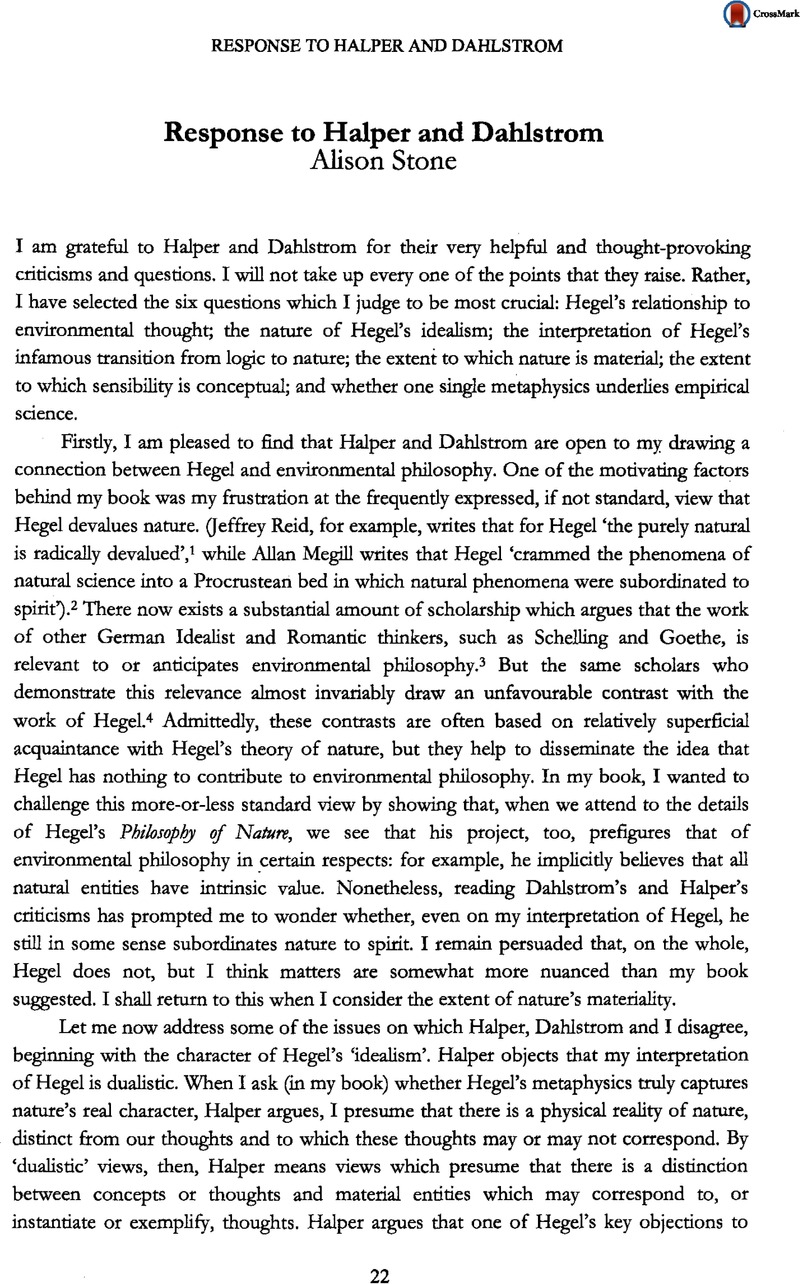No CrossRef data available.
Published online by Cambridge University Press: 23 June 2015

1 Reid, Jeffrey, ‘Hegel and the State University: The University of Berlin and its Founding Contradictions’, Owl of Minerva 32: 1 (2000), p. 11 CrossRefGoogle Scholar.
2 Megill, Allan, Karl Marx: The Burden of Reason (Lanham, MD.: Rowman & Iittlefield, 2002), p. 37 Google Scholar.
3 See, for example, Miller, Elaine, The Vegetative Soul: From Philosophy of Nature to Subjectivity in the Feminine (Albany: State University of New York Press, 2002)CrossRefGoogle Scholar; Wirth, Jason M., The Conspiracy of Life: Meditations on Schelling and his Time (Albany: State University of New York Press, 2003)CrossRefGoogle Scholar.
4 For instance, see Miller, The Vegetative Soul, ch. 5; and Wirth, , ‘Introduction’ to Schelling Now: Contemporary Readings, ed. Wirth, (Bloomington: Indiana University Press, 2005), p. 5 Google Scholar: ‘The ecological sensitivity of Schelling's early writings, their receptivity to the call of the earth, is left largely unexplored by Hegel’.
5 Halper, , ‘The Idealism of Hegel's System’, Owl of Minerva 34: 1 (2002–2003), p. 20 CrossRefGoogle Scholar.
6 Beiser, , German Idealism: The Struggle Against Subjectivism 1781–1801 (Cambridge, Mass.: Harvard University Press, 2002), p. 353 CrossRefGoogle Scholar.
7 Hegel states that in nature ‘the idea appears in the element of mutual externality [Außereinander], […] in nature this subsists near this, this follows that, — in brief, everything natural is mutually external, ad infinitum, furthermore, matter, this universal basis of all the formations that are there in nature […] holds itself external to its own self’; Philosophy of Mind, trans. Miller, A. V. and Wallace, W. (Oxford: Clarendon Press, 1971), §381Z, p. 9 Google Scholar. All translations from this edition are amended.
8 For an explanation of Schelling's view, see Houlgate, Stephen, ‘Schelling's Critique of Hegel's Science of Logic ’, in Review of Metaphysics 53 (1999), pp. 99–128 Google Scholar.
9 See Feuerbach, Ludwig, ‘Provisional Theses for the Reformation of Philosophy’, in The Young Hegelians: An Anthology, ed. Stepelevich, Lawrence S. (New Jersey: Humanities Press, 1983), pp. 164, 166–7Google Scholar.
10 ‘[I]t is only man who is thinking mind and through this, and this alone, is essentially differentiated from nature’ ( Hegel, , Philosophy of Mind, §381Z, p. 14 Google Scholar).
11 ‘The transition from nature to mind is not a transition to something wholly other, but is only a coming-to-itself of the mind which is outside itself in nature’ ( Hegel, , Philosophy of Mind, §381Z, p. 14 Google Scholar). And: ‘the eternal idea dwelling in nature, or, what is the same thing, the implicit mind working within nature, brings about the idealisation, the sublation of the externality, because this form of mind's existence conflicts with the interiority of its essence’ (§381Z, p. 13).
12 See, for example: Adorno, Theodor and Horkheimer, Max, Dialectic of Enlightenment: Philosophical Fragments (London: Verso, 1997), pp. 3–5 Google Scholar; Horkheimer, , Eclipse of Reason (New York: Continuum, 1974), esp. pp. 105–109 Google Scholar; Marcuse, Herbert, One-Dimensional Man (Boston: Beacon Press, 1964), esp. pp. 157–158 Google Scholar.
13 To be more exact, Adorno concedes that his generally pessimistic view of modern capitalist society oversimplifies and actually only picks out tendencies, but he defends his simplification on strategic grounds; see Cook, Deborah, Adorno, Habermas, and the Search for a Rational Society (London: Routledge, 2004), p. 173 CrossRefGoogle Scholar.